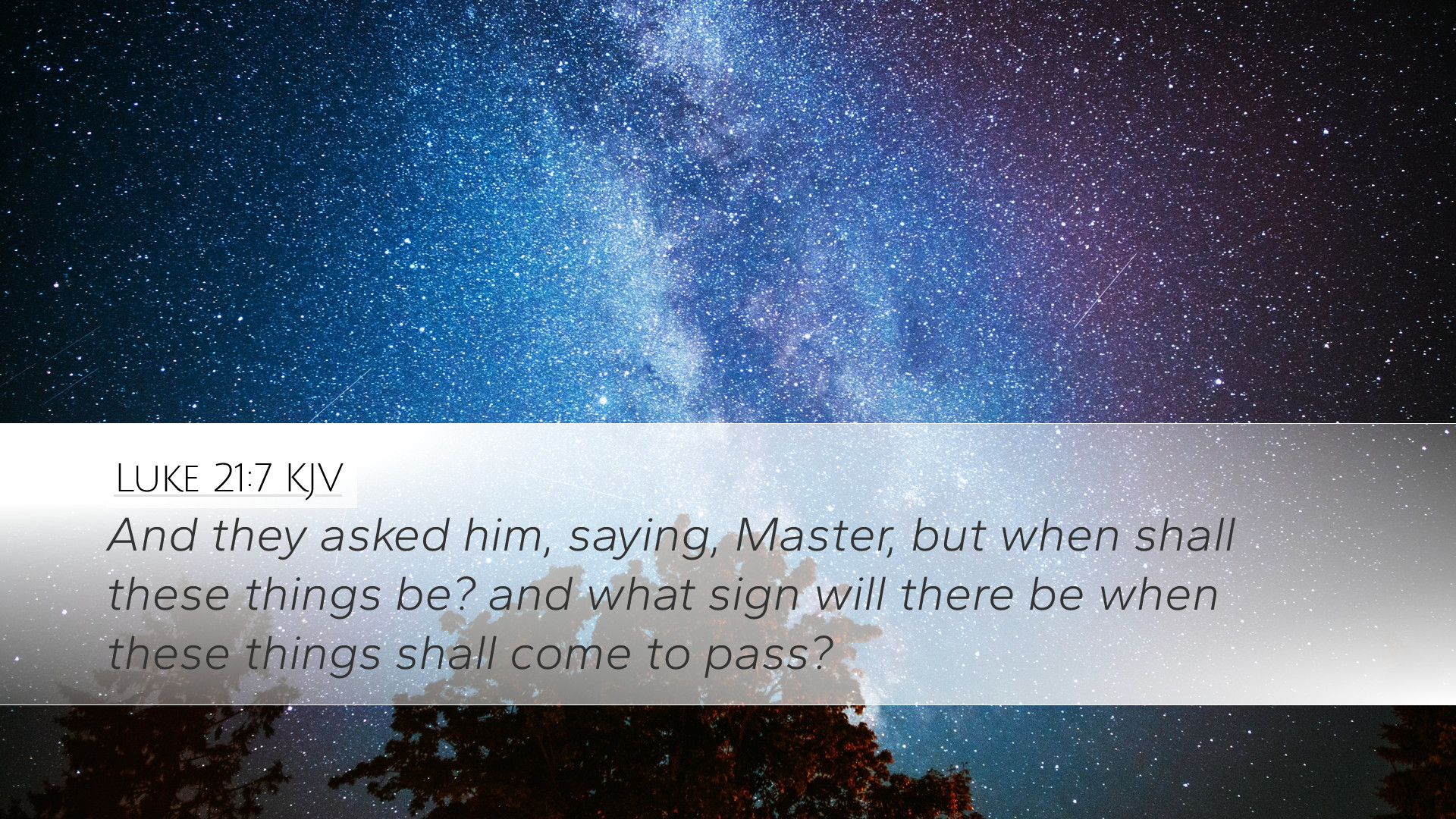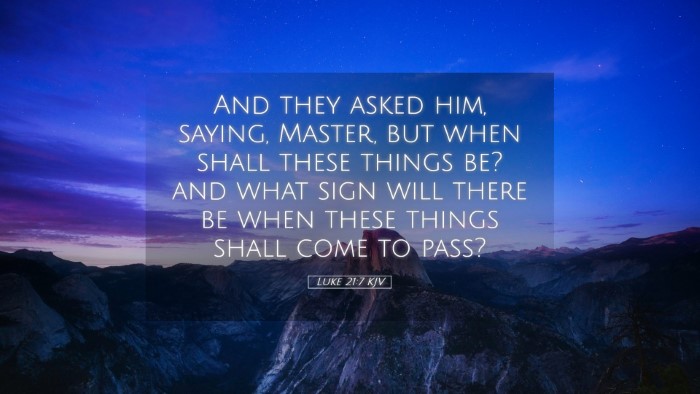Commentary on Luke 21:7
The passage of Luke 21:7 is significant for its introduction into a discourse regarding the end times, the fate of the temple, and the signs preceding Christ's return. The disciples ask Jesus about the destruction of the temple and the signs that would indicate its impending doom. This question opens up a profound discussion about the nature of prophetic signs, the endurance of faith under persecution, and the ultimate fulfillment of God's promises.
Contextual Background
As we examine Luke 21, it is vital to understand the historical and cultural context in which this scripture is situated. The Jewish Temple in Jerusalem was the heart of Jewish worship and national identity. Thus, its potential destruction was a deeply frightening prospect for the disciples. The awe and reverence attributed to the temple amplified their concerns.
Verse Analysis
When the disciples pose the question: "Teacher, when will these things be, and what will be the sign when these things are about to take place?" (ESV), they are not merely expressing curiosity; they are grappling with existential uncertainty about their faith and future.
Insights from Public Domain Commentaries
Matthew Henry's Commentary
Matthew Henry emphasizes the earnestness of the disciples’ inquiry as reflective of human nature — a desire to discern the future and understand calamity. He highlights that their question combines two elements: timing and signs, indicative of their struggle for certainty in an uncertain world. Henry notes, “It is natural for us to desire a foresight of events that we may prepare for them.” His insights remind pastors and theologians about the necessity of preparing congregations for life's uncertainties, rooted in a steady faith.
Albert Barnes' Notes
Albert Barnes provides a thorough examination of the term "these things," noting it refers to the prophesized destruction of the temple and the exact circumstances surrounding it. He also explores the psychological burden under which the disciples operate, acknowledging how spiritual leaders should take heed of the questions that trouble their followers. Barnes writes that Jesus's response to the disciples is meant to fortify them, “to teach them that God would not forsake them” even amid overwhelming tribulations. This assurance is instrumental for understanding the protective, guiding work of Christ in believers' lives even in challenging times.
Adam Clarke’s Commentary
Adam Clarke’s perspective showcases the theological ramifications of the disciples’ question. He points out how their ignorance about the depth and breadth of Jesus’s prophecy reflects a broader misunderstanding of the Messianic mission. Clarke argues that their obsession with the destruction of the temple revealed a lack of comprehension of Christ's impending spiritual kingdom. He asserts, “They looked for a temporal salvation, and knew not that peace, safety, and security could only be obtained in the heaven of glory.” This provides a crucial reminder for theologians and educators about the importance of guiding believers from a temporal perspective to an eternal understanding of God’s kingdom.
Spiritual Implications and Applications
The inquiry posed by the disciples is timeless, echoing in the hearts of modern believers who question the uncertainties of life, the presence of divine judgment, and the promises of Jesus. In a world where the foundations of faith are often shaken by current events, it is crucial for pastors to educate their congregants about the importance of faith that looks beyond the temporal. The discourse in Luke 21:7 calls attention to:
- The value of vigilance: Christians are urged to maintain a watchful eye towards the signs, an active waiting that requires engagement with scripture and prayer.
- The assurance in God’s sovereignty: Believers are reminded of the abiding presence of God, especially during moments of despair.
- The hope of restoration: The prophecy ultimately points toward the culmination of God’s plan, offering hope in the face of destruction.
Conclusion
Luke 21:7 is not merely a historical inquiry but a profound exploration of faith’s resilience in the face of uncertainty. Through the shared insights of traditional commentaries, we gain a broader understanding of the theological significance of this scripture. It echoes an age-old truth: despite our fears and questions about the end times, God remains faithful to His promises. As we revisit this passage, may we draw strength and encouragement from it, committing to nurture our faith and prepared hearts through the gifts of discernment, prayer, and community.


